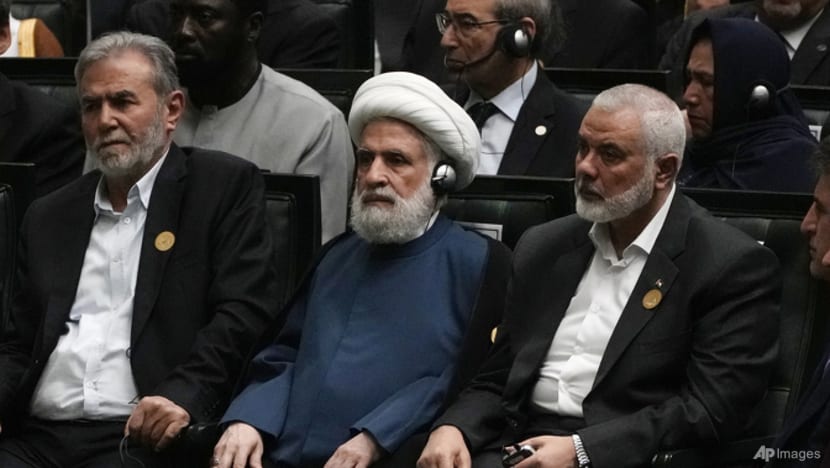Snap Insight: Killing of Ismail Haniyeh and other Hamas leaders won’t end Gaza war
The deaths of Ismail Haniyeh and other key figures from Hamas and Hezbollah are unlikely to impact the course of the Gaza war significantly, says Clemens Chay of NUS’ Middle East Institute.


This audio is generated by an AI tool.
SINGAPORE: The assassination of Ismail Haniyeh, the leader of Hamas’ political bureau, on Wednesday (Jul 31) deals a heavy blow to the militant group behind the Oct 7, 2023 attacks on Israel.
However, it will likely only complicate talks for a ceasefire in Gaza - not upend them, nor push them towards a speedy resolution.
Hamas accused Israel of carrying out the killing, but there has been no comment yet from the latter. Nevertheless, the killing follows a pattern of Israel targeting leaders of Iranian proxy groups. News of Haniyeh’s death came just hours after the Israel Defense Forces (IDF) claimed it killed a senior Hezbollah official in an air strike on a Beirut suburb.
A few weeks ago, Israel said it believed that Mohammed Deif, the leader of Hamas’ military wing Qassam Brigades, and an alleged mastermind behind the Oct 7 attacks, was felled by an air strike.
The deaths of these and other key figures of the groups arrayed against Israel have not impacted the course of the war significantly, and that is likely to hold true in the wake of Haniyeh’s death. Haniyeh was the diplomatic - and, indeed, pragmatic - face of Hamas, along with his predecessor, Khaled Meshaal.
HAMAS CANNOT BE DEFEATED BY VIOLENCE ALONE
The impact of Haniyeh’s killing should therefore be understood as a blow to the ongoing ceasefire talks, and, second, in terms of political optics, since he was an early proponent of Hamas’ politicisation. Both his and Hamas’ entry into politics later led to his appointment as Palestinian prime minister, when the group won the 2006 legislative elections.
But the same political involvement, coupled with his status as leader in exile, meant that a gap had opened up between Haniyeh’s base in Qatar and ground operations in Gaza, which are led by Yahya Sinwar. There have been multiple reports that Sinwar ordered the Oct 7 attacks without consulting Hamas’ political leadership in Qatar, giving rise to strains within the group.
The other reality is that Hamas and other groups have no shortage of replacements for fallen leaders. Other heads of Hamas have been killed by Israel in the past, including Sheikh Ahmed Yassin, its founder, but these have not resulted in appreciable changes to its aims. In other words, Hamas’ ideology cannot be defeated by violence alone.
EXPECT RETALIATION
Another takeaway is that with the relatively pragmatic Haniyeh now gone, the hardliners will increasingly dominate Hamas’ actions.
Previous ceasefire negotiations, for instance, were perceived by Sinwar as a means to regroup, as opposed to finding room for a lasting peace deal, according to Egyptian mediators. Whether this will result in the radicalisation of a new generation of fighters will be of concern.
We can expect that both Hamas and Hezbollah will retaliate for the killings of their leaders. The actions of the latter, coming after a deadly rocket attack in the Golan Heights raise fears of an all-out war between both sides. With Israel and Hezbollah already on the precipice, any miscalculation will have regional implications.
Finally, it ought to be noted that Haniyeh was killed in Iran, where he was attending the inauguration of the Islamic Republic’s new president. According to reports, he held meetings with senior Iranian figures, including Supreme Leader Ayatollah Ali Khamenei.
This will ignite another paroxysm of panic over security in Iran. The country has already convened an emergency meeting of its Supreme National Security Council in response.
How Iran will respond to an Israeli attack on its soil - Haniyeh was not targeted in all the time he lived in Qatar - adds another layer of complexity and uncertainty to the question of what happens next as the war in Gaza enters its 10th month.
Dr Clemens Chay is a Research Fellow at the Middle East Institute at the National University of Singapore.















